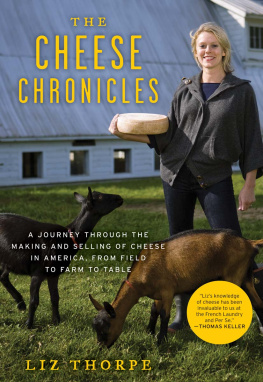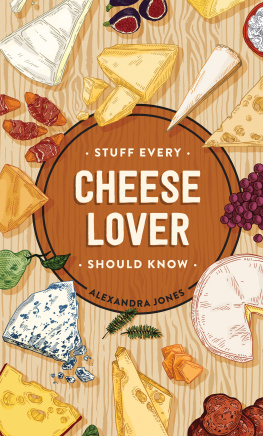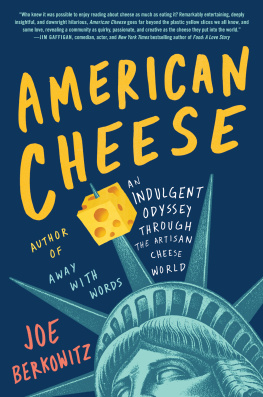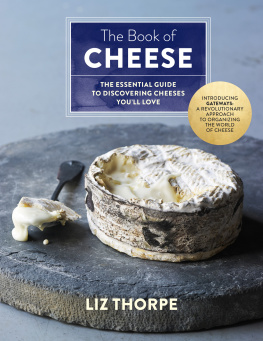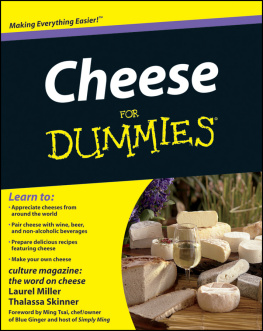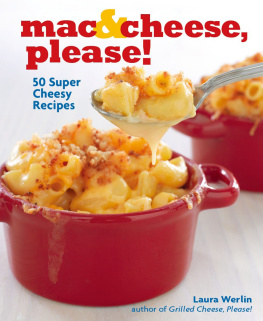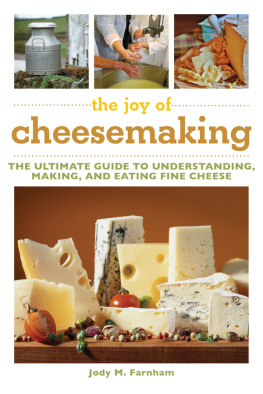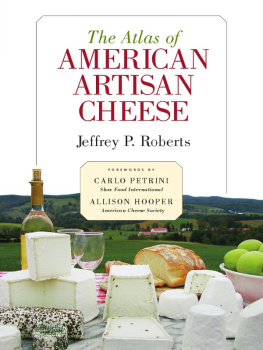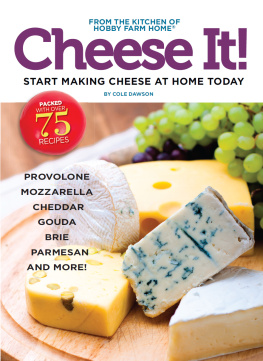The Cheese Chronicles
A Journey Through the Making and Selling of Cheese in America, From Field to Farm to Table
Liz Thorpe


For David
As the Big Bad Wolf said,
All the better to see you with, my dear
Contents
There are so many folks to acknowledge, and it is with deep gratitude that I do so:
Captaining my team of advisers, Rob Kaufelt has given me every possible opportunity to make cheese my life, at Murrays and beyond. Plus he makes me laugh really hard, most of the time. Joe Moskowitz taught me everything about cheese behind the scenes. Dick Hecht has wisely and lovingly begun to shape my future.
I am blessed to work at a company with extraordinary people who love cheese and really take care of one another. The staff of Murrays Cheese backs me every day, and I am especially grateful to the management team taking this journey with me: Taylor Cocalis, Jason Donnelly, Christopher Fernando, Louise Geller, Frank Meilak, and Will Whitlow.
All the cheesemakers in this book and beyond who have taken time out of their exceedingly busy lives to talk to me, educate me, and show me their farms, with particular thanks to Mary Keehn, Mateo Kehler, Soyoung Scanlan, and Ig Vella.
My agent, Angela Miller; my editor, Emily Takoudes; my eleventh-hour editor, Ginny Smith; and my publisher, Dan Halpern, who have believed in and encouraged this project through its many evolving lives.
My dear friends: Clelia Peters, the sister I never had, who has kept the faith since freshman year in college; Angie Keefer; and Sister Goddesses Lisa and Mary.
And most important, my mother. Ive got the best one out there and am tremendously blessed.
FOREWORD
by Steven Jenkins
Im fifty-eight years old. Ive lived in New York City for thirty-six years, since 1973, when I was just a twenty-two-year-old kid. In the late summer of 1975 I got a much-needed job in a cheese shop at 92nd Street and Madison Avenue. It could have been a pet shop in Greenwich Village, an East Side antique shop owned by some oddball, a kite store such as the one I had been working in not far awayI didnt care. Cheese had nothing to do with it. I decided I liked getting a regular paycheck and having something to do all day, so I resolved to do my very best to hold the job and pay the rent on my studio apartment, and not be a burden on my girlfriend (to whom I have now been married for twenty-seven years).
I became a matre fromager. In 1980, I became the first French-certified, practicing master cheesemonger in North America. For all the years since then Ive been up to my elbows and eyeballs in cheese and cheese-related substances. It is said I know whereof I speak. Last year I was given a lifetime achievement award by the American Cheese Society. I belabor my qualifications to state the following: Liz Thorpe has written a book about American cheese, and it is the best book about cheese youll ever read. And Ive read all of the books about cheese. My library is immense. Patrick Rance wrote a book about French cheese a number of years ago; he died recently after a long and fruitful life. Mr. Rances book is magnificent and has been a huge influence on me for a long time. Its out of print, but it sells on eBay for many hundreds of dollars. Liz Thorpes book has the same power and purpose that Rances The French Cheese Book has. There are a number of new and newish books about cheese, among them Max McCalmans Cheese , that are excellent too. I have a raft of books about cheese written and published in Europe, and while clinical, they are very important. But to the reader who wishes to truly grasp and be exhilarated by the infinite connections between lyric beauty, the beast, the sky, the earth, and people, I cannot more fervently recommend these pages.
Lizs book tells you more about American cheese than my book ever did, thats for sure, and my book was the first to address the subject of artisanal American cheeses and cheesemakers. Lizs book goes way beyond the black-and-white static of my book. She makes the cheeses and the cheesemakers jump off the page. She teaches you how to look at a cheese, how to describe the flavors and fragrances of cheese, and what the nature and provenance and recipe of a cheese mean. I feel like I never even thought of these things until I read Lizs book, and thats flat-out amazing, because there is little else I have thought about for all these years, and Im not exactly stupid. Im not exactly without my own offices, so to speak.
What shames me most about this book is that I never appreciated how hard it is to do what these American cheesemakers do day in and day out, day after day, and how little they are remunerated for it. These folks have created an incomparable American heritage, and they have done so in an astonishingly short time. This fine book is a testament to that accomplishment, which is, or should be, what this country is all about.
FOREWORD
by Rob Kaufelt
For most Americans, the word cheese brings a smile to the face. Over time, the word itself has taken on a faintly humorous quality, as opposed to the French fromage or the Italian formaggio , which are proper food words and thus taken more seriously.
Which makes it all the more interestingpeculiar, in factthat any intelligent young person coming out of one of our nations leading centers of higher learning would ever consider seeking a career in cheese. Not law, not banking, not medicine, but cheese. Can a career in cheese truly be said to exist?
A decade ago, I would have said no. The business, such as it was, remained a last bastion of chauvinism, like the butcher shop, with old-timers manning the few service counters still left in New York. A few curmudgeons, like Steve Jenkins and myself, had been to college and wound up behind the counters like so many wheels of aged Parm. Although Id purchased a small, old, dilapidated shop selling this comestible, I was without any pretension of calling it a career. No, I preferred the way Murray Greenberg, who named the shop after himself (Murrays, not Greenbergs), thought of it: Its a living.
That was before Liz Thorpe came along. I date the modern cheese era from her arrival back in 2002. It began to seem possible, if not likely, that what we did was more than a job or a living, and certainly not a joke. Something worthy, something that one might take a little more seriously than had been the case up until now. Liz has led the way to a whole new career path for her generation, opened it up to women, too, and begun to professionalize our craft.
Yet even though I witnessed it, enabled it, and encouraged it, the whole thing still remains a mystery to me. As with my colleagues of a certain age, I am often compelled to political incorrectness, if only to feebly maintain my turf, having come of age in the time of women, yet having sought refuge in a mans world. How, I wonder, does an adorable blond Yalie with a nose ring take charge of a cheese revolution, write two books about it, arm-twist it into the modern age, introduce it into the nations largest supermarket chain, and take over the daily operations of New Yorks premier cheese retailer, all before the age of thirty?
And having done so, she now pied-pipers a slew of even younger women (and a few men) who follow her, leaving me shaking my head in wonder and nodding in agreement over (most) of what she does. Learn from this, all you young investment bankers! Passion for your craft trumps money in any person with self-respect and true talent.

